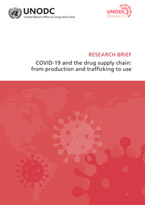 United Nations Office on Drugs and Crime (UNODC)
United Nations Office on Drugs and Crime (UNODC)
Overview: The COVID-19 crisis is taking its toll on the global economy, public health and our way of life. The virus has now infected more than 3.6 million people worldwide, killed 250,000 and led Governments to take drastic measures to limit the spread of coronavirus disease 2019. Roughly half of the global population is living under mobility restrictions, international border crossings have been closed and economic activity has declined drastically, as many countries have opted for the closure of nonessential businesses.
Drug trafficking relies heavily on legal trade to camouflage its activities and on individuals being able to distribute drugs to consumers. The measures implemented by Governments to counter the COVID19 pandemic have thus inevitably affected all aspects of the illegal drug markets, from the production and trafficking of drugs to their consumption.
Having said that, the impact of those measures varies both in terms of the different business models used in the distribution of each type of drug and the approaches used by different countries to address the pandemic. These range from the closure of international border crossings, while allowing domestic travel, to moderate-to-strict shelter-in-place orders, or a complete lockdown of all activities, including suspension of essential services other than for emergencies. The impact on actual drug production may vary greatly depending on the substance and the geographical location of its production.
Based on the most recent data from government authorities, open sources, including the media, and the network of UNODC field offices, the evidence available suggests the following ongoing dynamics in the impact of the COVID-19 pandemic on the illicit drug markets.
